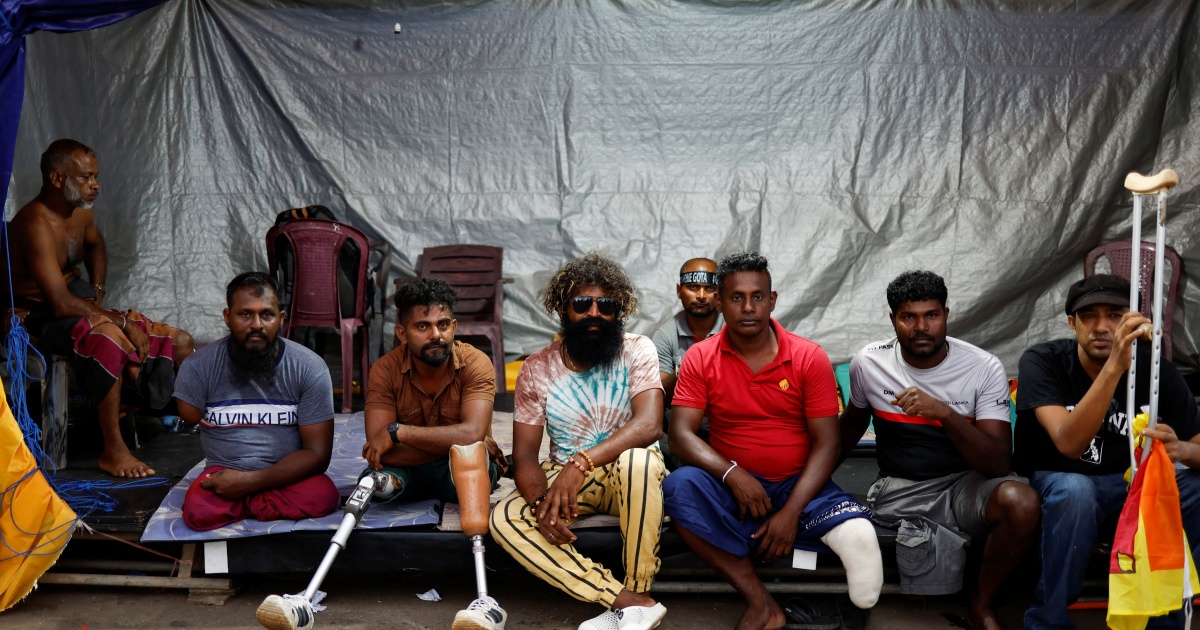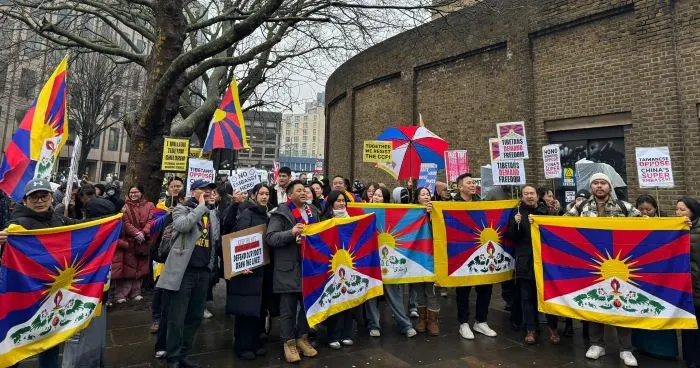At Sri Lanka protest camp, army veterans once led by president
Dozens of veterans are camping out near the president’s office, having lost faith in a leader who is resisting calls to resign.
Missing both legs and an arm, former special forces soldier Thushara Kumara is an unlikely critic of Gotabaya Rajapaksa, a wartime defence chief who became Sri Lanka’s president in 2019.
But the 43-year-old army pensioner is one of several dozen veterans now camping out at a protest site near the president’s office in Colombo, having lost faith in a leader who stubbornly resisted calls to resign when the economy began to implode and most of his cabinet quit.
“We dedicated our lives to save this country and it is extremely sad to see what has happened to it now,” Kumara said, sitting surrounded by old comrades, several with prosthetic limbs.
Weakened by the pandemic, the Indian Ocean island’s economy was fast-tracked towards disaster by a surge in global oil prices following Russia’s invasion of Ukraine in late February. The government finances were already in a parlous state, partly owing to populist policies, including tax cuts.
Rapidly dwindling foreign currency reserves left Sri Lanka, a country of 22 million people, without enough dollars to pay for vital imports of fuel, food and medicine, and violent street demonstrations erupted this month as shortages and power cuts became acute.
Earlier this month, Sri Lanka kicked off talks with the International Monetary Fund (IMF) for a programme to stabilise the economy. The government is also in talks with several countries and multilateral agencies to line up about $3bn in bridge financing and has suspended repayment on some of its foreign debt to divert funds to pay for essential imports.
Amid the unfolding crisis, there have been street protests countrywide, with thousands of people joining some demonstrations.
“I get a pension because of the taxpayers of this country, and we have a responsibility to step up now and support the brave efforts by these young people to save this country,” Kumara said.
“They are fighting for this country’s future,” said the veteran, who had served in the army for 16 years. “That is why we are here.”
Father to three children, Kumara lost his limbs in a mortar explosion weeks before Sri Lanka’s bloody 26-year civil war against Tamil separatists ended in May 2009.
Rajapaksa and his brother, then-president Mahinda Rajapaksa, ordered the offensive that finally broke the rebels’ resistance, but thousands of people died in the onslaught.
At the small but growing protest camp by Colombo’s waterfront, people of all ages and faiths, including Muslims breaking their Ramadan fast, saffron-clad Buddhist monks and Catholic nuns wearing habits, gathered.
Although there were only a few dozen army veterans, their presence indicated the discontent had reached even Rajapaksa’s most ardent supporters.
Ministry of Defence spokesman Colonel Nalin Herath declined to comment on the involvement of veterans in the protests, though he said the military supported the government’s position to allow peaceful dissent.
“The defence secretary has clearly stated there will be no obstruction to peaceful protests,” he said.
The veterans, some of whom have travelled hundreds of kilometres from their homes, sleep on thinly-padded mats by the busy seafront road, taking turns to use public toilets located further down the scenic stretch of beach.
“We are used to hardship. So, we aren’t too worried about meals,” Uditha Roshan, 40, said, sipping on ginger tea provided by volunteers as passers-by stop to take selfies with the men, most of whom are amputees.
Many of the veterans said they would not vote for Rajapaksa again, having backed him in 2019 when he campaigned hard on national security in an election that came months after the Easter bombings rocked the nation.
“He will not get the chance to be a presidential candidate again,” said H M S Mahindasiri, 40, a double amputee who voted for Rajapaksa three years ago.
“The people have no faith in him.”













